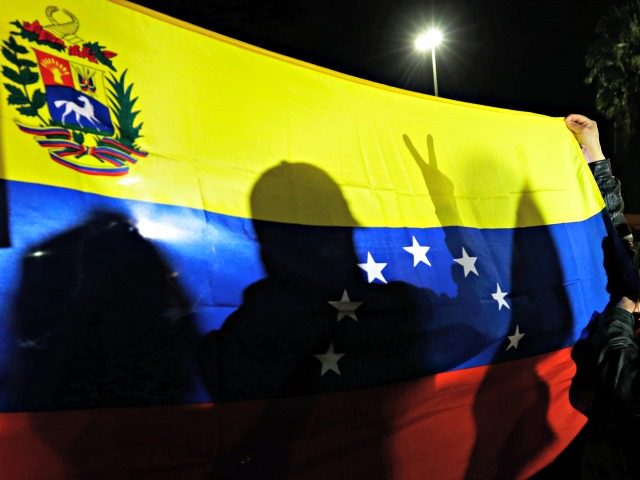WASHINGTON, DC — U.S. President Donald Trump’s administration is “seeking new authority to support a democratic transition” away from the murderous dictatorship of socialist dictator Nicolas Maduro that has plunged the South American country into political chaos and starvation, Secretary of State Mike Pompeo told a House panel on Wednesday.
The Trump administration has led an effort in the United Nations, backed by about 50 countries, to recognize Juan Guaido as the interim president of Venezuela.
During a House Foreign Affairs Committee hearing Wednesday on the U.S. Department of State (DOS) fiscal year 2020 budget, Pompeo described Guaido as the “proper leader that was designated by the Venezuelan people through their constitution.”
In written testimony prepared for House lawmakers, Pompeo declared:
As the people of Venezuela continue to fight for their freedom, the budget request includes funding to support democracy and prosperity in Venezuela. The budget also requests new authority to support a democratic transition in Venezuela, including transferring up to $500 million to foreign assistance accounts.
During the hearing, he told lawmakers that the goal of the Trump administration is to ensure “that Cuban and Russian influences are out, Maduro and his cronies are all gone, and we begin to rebuild the democracy and the world will have to provide the economic assistance to get them to this transition period. The United States will certainly be part of it.”
“We’ve seen Russia continue trying to exert influence,” he told lawmakers. “We know that the Cubans are providing some substantial support to the Maduro regime.”
Pro-Maduro Russia has reportedly deployed troops and military equipment to Venezuela in recent days. Echoing the U.S. intelligence community and the military, Pompeo warned that Russia and China are cooperating “operationally and tactically” in the South American country and beyond.
Pompeo acknowledged that a democratic transition in Venezuela would “be a long process,” adding:
The Maduro regime’s destruction of the economy in Venezuela is not as a result of the sanctions that the United States has put in place over the last months, this is years of socialist leadership that has completely put their primary revenue source, their fossil fuel resources, in a place that’s going to cost…between $6 and $12 billion and years to repair.
Pompeo appeared to agree with the assessment from Rep. Michael McCaul (R-TX), the ranking member of the House panel holding the hearing, that “failure” is not an option for the Trump administration in Venezuela.
Asked by Rep. McCaul about the consequences to the United States and the Western Hemisphere if the Trump Maduro remains in power, Pompeo said:
I’m of the nature that I try not to contemplate failure too often but we have certainly considered what the risks are associated with the efforts that we provided…allowing Maduro to continue will have as its primary negative outcome — continue to with the destruction of the Venezuelan economy and real hardship for the Venezuelan people.
We certainly have an importance in terms of the risk of terror, the risk of chaos in that economic [environment] and refugees flowing from those regions…so there’s lots of downside if the Venezuelan people’s objective is not achieved.
DOS has long accused the socialist regime in Venezuela of offering a permissive environment for Iran’s narco-terrorist proxy Hezbollah to freely operate in the region. The U.S. military has long warned against the activities of Iran and Hezbollah in Latin America.
Echoing Pompeo, Rep. McCaul noted that the socialist policies in Venezuela had rendered the country a failed state.
McCaul declared:
We can all agree that the socialist policies of Nicolas Maduro have turned the once rich country into a failed mafia state. With little food and medicine, millions of people are suffering more every day and forced to flee to other countries in the region.
Maduro’s armed thugs are blocking the delivery of humanitarian aid. They’ve shot innocent civilians, kidnapped the Chief of Staff for interim President Juan Guaido and just yesterday Guaido’s motorcade was attacked.
Rep. Eliot Engel (D-NY), the chairman of the House Foreign Affairs Committee, did not mention the Trump administration’s efforts to stabilize Venezuela in his opening statement. He did, however, blast State’s budget request, saying:
Let me be clear: this budget request was dead the moment it arrived on Capitol Hill. I don’t know whether the Administration really believes we can mount an effective foreign policy— one that advances American interest, values, and security —- on a shoestring budget or if the people calling the shots just don’t care. But Congress won’t stand by and see American leadership on the global stage undermined. And that’s not just our opinion. That’s the power of the purse, That’s what we’re supposed to do.
Democrats control the House, which has the power to authorize spending.
Rep. McCaul did note that he agreed with the chairman that certain cuts within DOS may have “unintended consequences that cost us more in the long-term.”

COMMENTS
Please let us know if you're having issues with commenting.